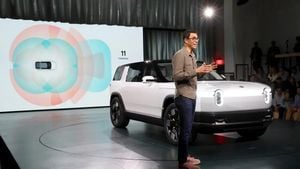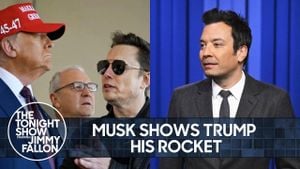Jaguar’s latest rebranding campaign has caused quite the uproar, igniting passions among fans and critics alike. The British luxury car manufacturer, known for its storied legacy of elegance and performance, has rolled out what many have labeled as its most audacious rebrand yet. Launched with the slogan "Copy Nothing," the campaign has thrust the iconic brand back under the scrutiny of the public eye after it unveiled a new minimalist logo and marketing strategy via social media.
On November 18, 2024, Jaguar released a 30-second advertisement which features models sporting vibrant outfits, but shockingly, no actual cars. This unusual move left many wondering if the brand had strayed too far from its roots. The video rapidly amassed around 120,000 comments on social media, where responses ranged from passionate support to vehement criticism, with some labeling the direction as "woke" and "unhinged."
Rawdon Glover, Jaguar’s managing director, did not shy away from addressing the backlash. He condemned the "vile hatred and intolerance" directed toward the models featured, emphasizing Jaguar's intent to appeal to a more diverse and younger audience. Nevertheless, the question remains: does this rebranding risk alienation of Jaguar’s longstanding loyal customer base, who have long associated the brand with traditional automotive values?
Part of the rebranding entails moving away from long-held traditions. The new Jaguar logo ditches the classic "growler" depiction—a roaring jaguar—and opts for lowercase lettering combined with a quirky capital “G.” The company is also preparing to embrace the all-electric future, positioning its first electric model, a four-door Grand Tourer, for debut by 2026.
Glover asserts, "If we play the same way everyone else does, we’ll get drowned out," which suggests they are not merely responding to market trends but actively trying to reshape their identity. The traditional imagery embedded within flyers and advertisements—think classic cars piercing through scenic landscapes—has been cast aside for something decidedly different. This creative pivot aims to differentiate Jaguar from its competitors amid the industry's growing emphasis on electric vehicles.
Critics have pointed out, with skepticism, the absence of automobiles in the commercial. Elon Musk, the owner of X (formerly Twitter), cheekily asked, "Do you sell cars?" showing how some high-profile figures are not just passive observers of the rebrand but are becoming part of the conversation. The response from Jaguar was equally cheeky, inviting Musk to visit them during the Miami art exhibition planned to showcase the new design vision.
The marketing strategy behind the rebrand has invited comparisons to past advertising campaigns from other major brands. For example, Keith Wells, who has previously worked on reboot strategies, recalled Apple’s celebrated "Think Different" advert from 1997, which featured iconic figures rather than products. Likewise, Jaguar is now taking a similar risk, prioritizing vibe over product demonstration.
Among those embracing the change, some industry experts view this rebranding as necessary for growth. Lee Rolston, the chief growth officer at Jones Knowles Ritchie, noted, "Rebrands typically occur when companies wish to shift their business strategy," asserting the importance of creating discussions around the rebrand, even if it spirals toward controversy.
Rebranding can ignite curiosity and stimulate public engagement. Glover mentioned he wants the daring ad to stir emotion and provoke conversations, stating, "To live is to evolve," indicating Jaguar’s philosophy behind this bold move. Yet, the backlash raises questions about execution and approach; are they stirring excitement, or simply turning loyal customers away?
While Glover wishes to maintain connections with existing customers, there is undeniable pressure to appeal to new demographics. Editorial director Erin Baker shared her thoughts, pointing out the overarching challenge: to attract those who may have perceived Jaguar as outdated or solely for affluent older consumers. Baker highlighted, "It’s been languishing in terms of sales for years now," emphasizing the urgency for Jaguar to innovate.
Responses have varied greatly. For every voice supporting the change for its break from tradition, there are just as many condemning it for straying from what made Jaguar distinctive. Those opposing the campaign argue it discards the essence of Britishness the brand once carried, echoing sentiments like "This is not British!"
Memes have taken social media by storm, with some users humorously mocking Jaguar’s shift, likening it to something gimmicky, even due to the playful antics of competitors like Specsavers, who parodied Jaguar's logo. Aldi also joined the fray, quipping about Jaguar's creative slogan, "You sound like our legal team." The playful jabs continue to highlight the schism among audiences around this marketing strategy.
One of the more sobering points raised by critics is whether this substantial pivot align with Jaguar's future growth or if it reflects misguided priorities. Glover asserts their vision is geared toward inclusivity and appealing to contemporary sensibilities without discarding the brand’s legacy. The dialogue around whether to align traditions with innovation continues as Jaguar prepares to step boldly yet critically onto the future of the automotive stage.
Opinions vary widely, but what remains unchallenged is the effectiveness of the campaign in generating immense buzz and engagement. Like it or dislike it, Jaguar’s rebranding has had the world talking—and maybe that's precisely what they aimed for. The next chapter for Jaguar awaits, and everyone will be watching closely as they navigate the challenges and opportunities this bold move presents.



